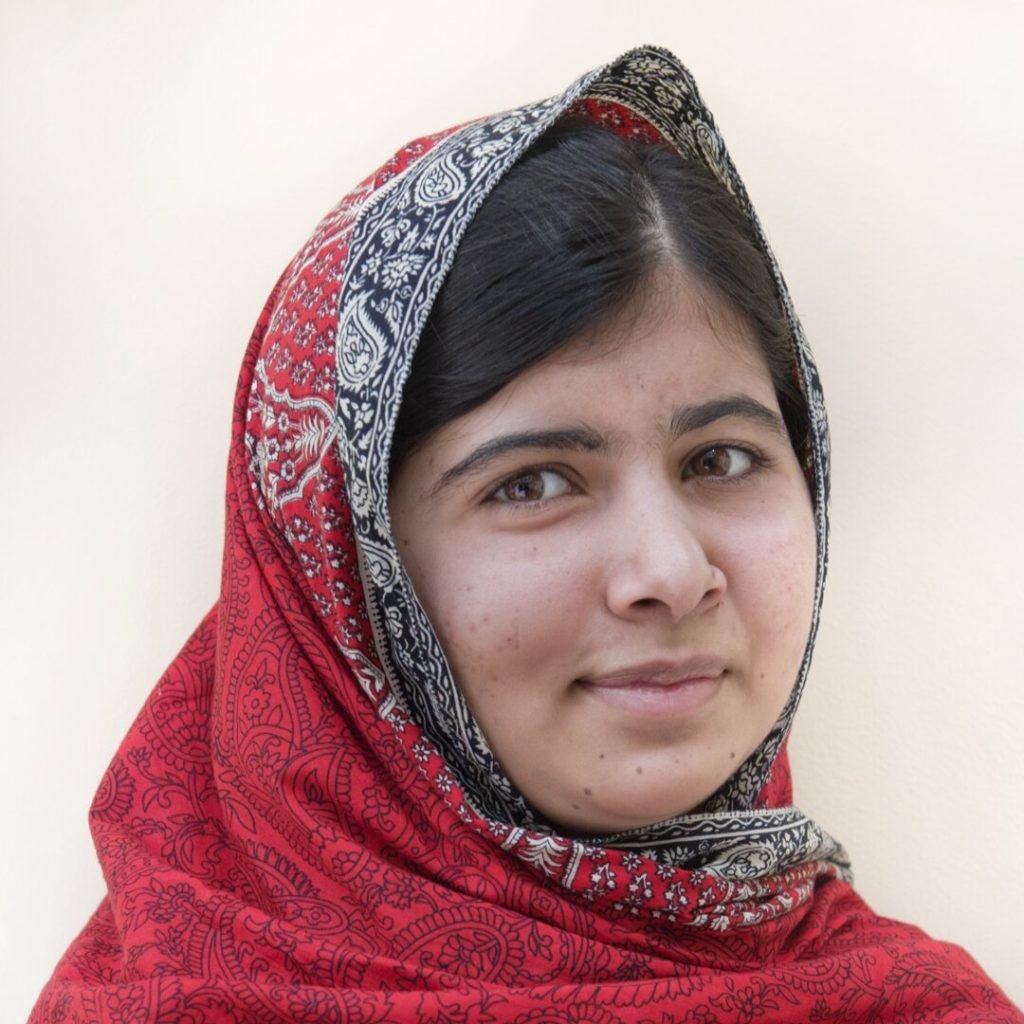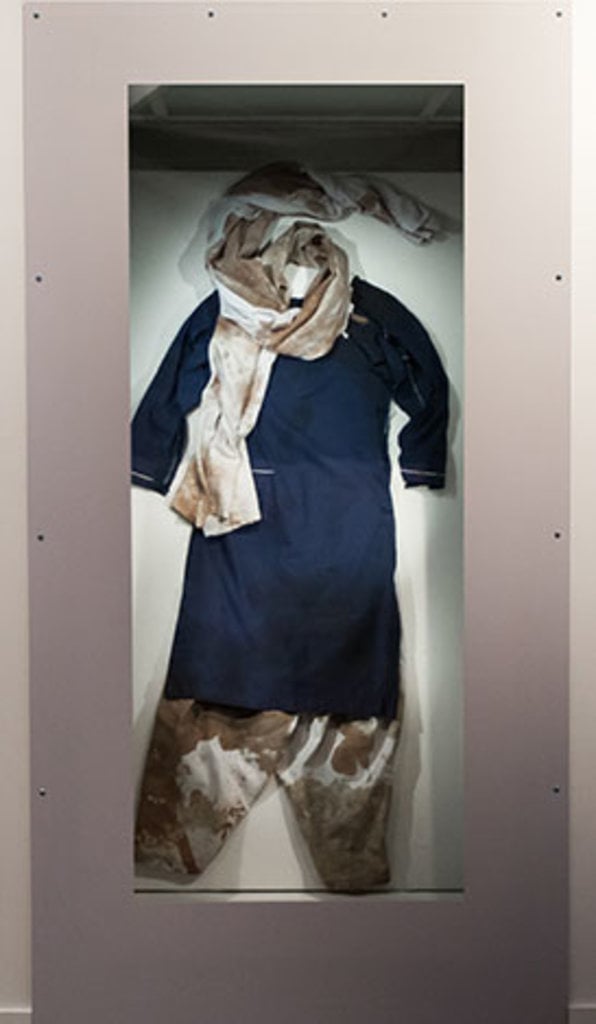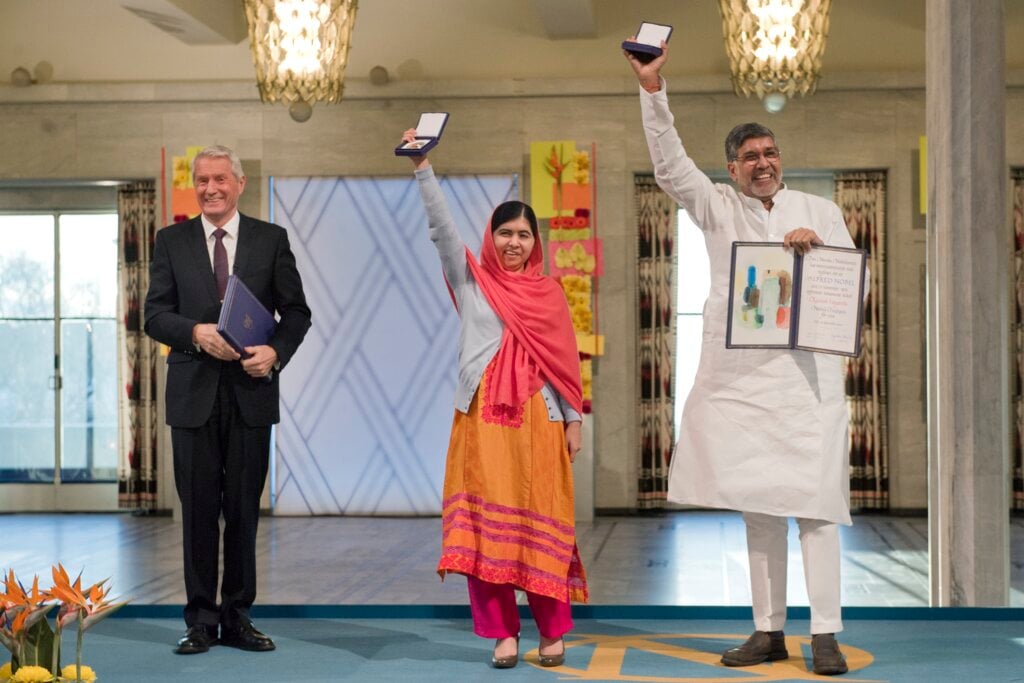Malala Yousafzai
Speed read
Malala Yousafzai was awarded the Nobel Peace Prize, jointly with Kailash Satyarthi, for her struggle against the suppression of children and young people and for the right of all children to education.

Full name: Malala Yousafzai
Born: 12 July 1997, Mingora, Pakistan
Date awarded: 10 October 2014
“Pens are mightier than weapons”
Malala Yousafzai comes from the Swat Valley in Pakistan. In 2009 the Taliban decreed that all girls’ schools should be closed or there would be consequences. Malala continued to go to school. She started to blog about girls’ right to education, and became known as one who defied the school ban. On 9 October 2012 she was shot by the Taliban, but survived. She has not allowed threats to silence her and is a global voice as she continues to campaign for the right of girls to education. The Malala Fund helps to provide schooling for girls in Pakistan, Nigeria, Jordan and Kenya. Her message has been that children’s right to education is the foundation for peace, and an important measure in the fight against extremism. Aged just 17, Malala is the youngest ever Nobel Prize laureate.
"The extremists are afraid of books and pens. The power of education frightens them."
Malala Yousafzai, speech at the United Nations, 12 July 2013.

From the Nobel Committee’s announcement
“The Norwegian Nobel Committee has decided that the Nobel Peace Prize for 2014 is to be awarded to Kailash Satyarthi and Malala Yousafzai for their struggle against the suppression of children and young people and for the right of all children to education. (…) Despite her youth, Malala Yousafzai has already fought for several years for the right of girls to education, and has shown by example that children and young people, too, can contribute to improving their own situations. This she has done under the most dangerous circumstances. Through her heroic struggle she has become a leading spokesperson for girls’ rights to education.”
The voice from Swat
Malala has become the very symbol of girls’ right to education. At the age of 11 she became known for her blog on the BBC’s Urdu service and attracted international media attention. The world was appalled by the attempt to assassinate her in 2012, but Malala recovered and forgave her attacker. Political leaders and celebrities have paid tribute to the Pakistani schoolgirl and have endorsed her message that every child is entitled to go to school. The campaign “I am Malala” was launched to promote her cause. On Malala’s 16th birthday, 12 July 2013, she addressed the UN, which responded by naming the day “Malala Day”.
"Education is education. We should learn everything and then choose which path to follow. Education is neither Eastern nor Western, it is human."
Malala Yousafzai, in her book I Am Malala: The Girl Who Stood Up for Education and Was Shot by the Taliban.
Education is a human right
Articles 28 and 29 of the UN Convention on the Rights of the Child state that all children are entitled to an education. Education should aim to develop the child’s personality, talents, physical and mental capacities and be of good quality. UNESCO says that, worldwide, 57 million children do not go to school, over half of them girls. As many as 130 million children spend years at school without ever learning to read or write. Education helps to reduce child mortality, improves health, increases an understanding of democracy, results in higher wages and promotes economic growth.
| UN convention on the rights of the child Adopted in 1959 to give children particular protection so that they can grow up safely, no matter where in the world they live. Children shall be ensured access to food, shelter and education, and shall be protected from participation in child labour. |
| UNESCO United Nations Educational, Scientific and Cultural Organisation. Founded in 1946. Noted especially for its efforts to promote literacy. |
"I raise my voice not so that I can shout, but so that those without a voice can be heard."
Malala Yousafzai, speech at the United Nations, 12 July 2013.
Two sides of the same cause?
The Nobel Peace Prize to Kailash Satyarthi and Malala Yousafzai is an award both for human rights and humanitarian work. With this prize the Norwegian Nobel Committee wishes to build a bridge between nations, religions and generations. Kailash Satyarthi is a 60-year-old Hindu from India, while Malala Yousafzai is a 17-year-old Muslim from Pakistan. The two peace prize laureates work in different arenas, but are bound together in the fight for children’s rights and the goal of enabling every child to go to school. Both are supporters of non-violence, even in the face of threats and attacks by their opponents.

"I don't want revenge on the Taliban. I want education for sons and daughters of the Taliban."
Malala Yousafzai, in her book 'I Am Malala: The Girl Who Stood Up for Education and Was Shot by the Taliban'.
Learn more
Malala Yousafzai was born on July 12, 1997, in Mingora, the largest city in the Swat Valley in what is now the Khyber Pakhtunkhwa Province of Pakistan ...
Nobel Prize lecture
"When my world suddenly changed, my priorities changed too. I had two options. One was to remain silent and wait to be killed. And the second was to speak up and then be killed."
In her Nobel Prize lecture Malala Yousafzai spoke up for every child’s right to go to school. Read the lecture here
Disclaimer: Every effort has been made by the publisher to credit organisations and individuals with regard to the supply of photographs. Please notify the publishers regarding corrections.
Nobel Prizes and laureates
Six prizes were awarded for achievements that have conferred the greatest benefit to humankind. The 12 laureates' work and discoveries range from proteins' structures and machine learning to fighting for a world free of nuclear weapons.
See them all presented here.
